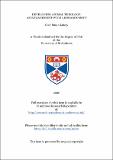Files in this item
Developing animal theology : an engagement with Leonardo Boff
Item metadata
| dc.contributor.advisor | Aguilar, Mario I. | |
| dc.contributor.author | Linzey, Clair Susan | |
| dc.coverage.spatial | 260 p. | en_US |
| dc.date.accessioned | 2020-04-16T09:54:19Z | |
| dc.date.available | 2020-04-16T09:54:19Z | |
| dc.date.issued | 2020-06 | |
| dc.identifier.uri | https://hdl.handle.net/10023/19812 | |
| dc.description.abstract | This thesis seeks to develop animal theology in dialogue with Leonardo Boff, specifically in relation to his liberation, ecological, and contextual theologies. Through an examination of his major works relating to creation—notably, Jesus Christ Liberator: A Critical Christology of Our Time (1972), Saint Francis: A Model for Human Liberation (1981), Ecology and Liberation: A New Paradigm (1993), and Cry of the Earth, Cry of the Poor (1995)—this thesis unravels the anthropocentric and instrumentalist thinking that characterises Roman Catholic thought about animals. In Jesus Christ Liberator, the work of Christ is considered only in relation to humanity, which in practical terms means that human beings—their life, worth, and destiny—are God’s primary, if not exclusive, concern. In Saint Francis, despite the obvious moral example provided, Boff almost wholly ignores Francis’s significance for other creatures, and his ecological theology tantalisingly remains insufficiently attentive to the animal issue. Yet Boff’s ecological theology represents a significant shift, and at least notionally, he accepts the rights of other creatures. So paradoxically, his ecological theology is a catalyst for greater concern for creation, including animals. Boff may have influenced the thinking of Pope Francis, especially in the pope’s Laudato Si’ (2015), and has certainly engendered greater theological thinking on the environment. Finally, this thesis proposes a non-anthropocentric reconstruction of the Trinity as Gentleness, Solidarity, and Fraternity, reinforced by Boff’s work in Trinity and Society (1986) and Holy Trinity, Perfect Community (1988). A Trinitarian theology of animal liberation is suggested based on, inter alia, the notion of communion as being “for” creation and the idea of Triune sight. The Trinity is proposed as a model for human–animal relations. | en_US |
| dc.language.iso | en | en_US |
| dc.publisher | University of St Andrews | |
| dc.subject | Animal theology | en_US |
| dc.subject | Leonardo Boff | en_US |
| dc.subject | Animal ethics | en_US |
| dc.subject | Ecological theology | en_US |
| dc.subject | Catholic theology | en_US |
| dc.subject | Liberation theology | en_US |
| dc.subject | Moral theology | en_US |
| dc.subject.lcc | BT746.L568 | |
| dc.subject.lcsh | Boff, Leonardo | en |
| dc.subject.lcsh | Liberation theology | en |
| dc.subject.lcsh | Animals--Religious aspects--Catholic Church | en |
| dc.subject.lcsh | Animal rights--Religious aspects--Catholic Church | en |
| dc.subject.lcsh | Animal rights--Moral and ethical aspects | en |
| dc.subject.lcsh | Christian ethics | en |
| dc.title | Developing animal theology : an engagement with Leonardo Boff | en_US |
| dc.type | Thesis | en_US |
| dc.type.qualificationlevel | Doctoral | en_US |
| dc.type.qualificationname | PhD Doctor of Philosophy | en_US |
| dc.publisher.institution | The University of St Andrews | en_US |
| dc.identifier.doi | https://doi.org/10.17630/10023-19812 |
This item appears in the following Collection(s)
Items in the St Andrews Research Repository are protected by copyright, with all rights reserved, unless otherwise indicated.

